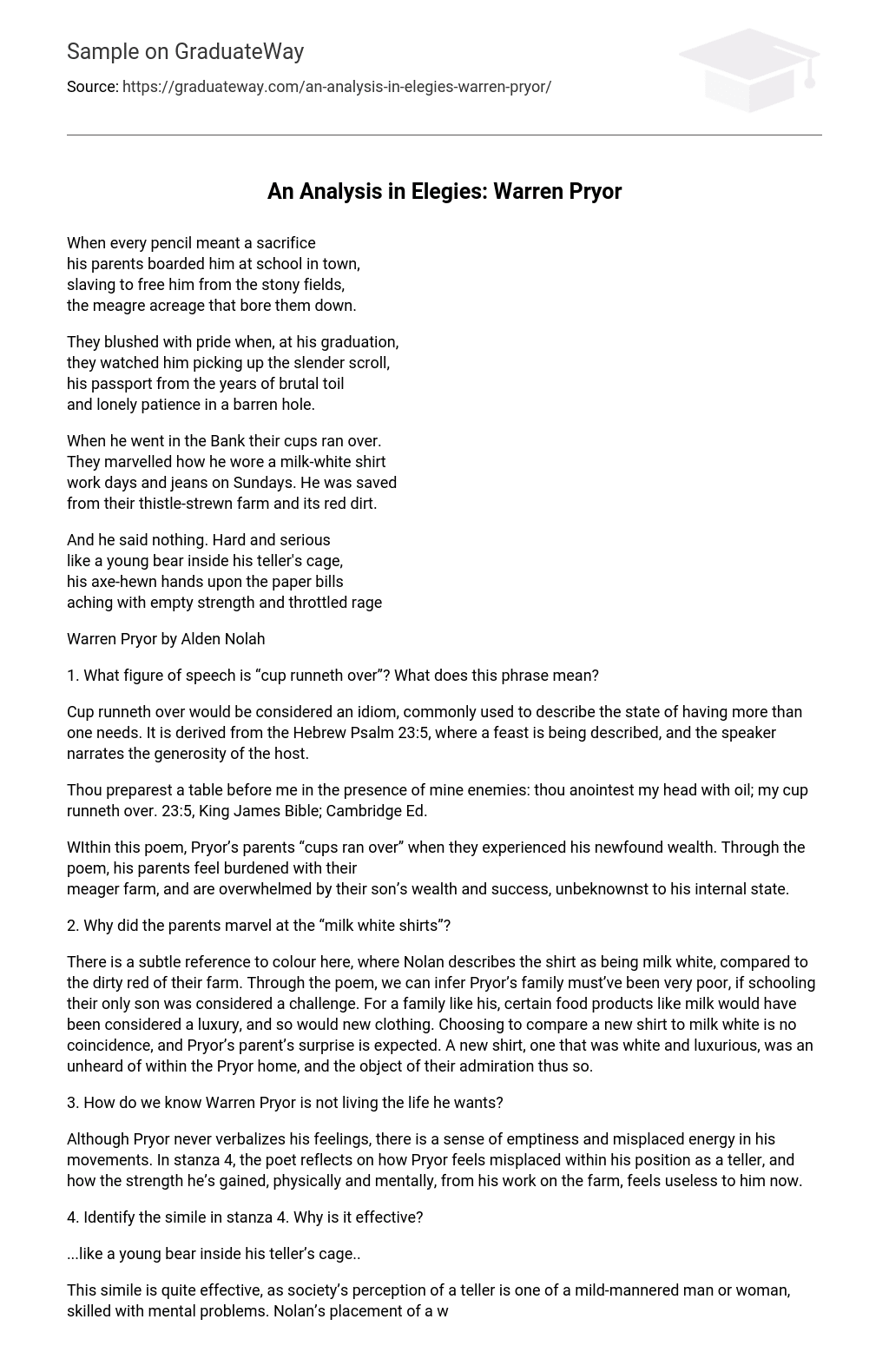When every pencil meant a sacrifice
his parents boarded him at school in town,
slaving to free him from the stony fields,
the meagre acreage that bore them down.
They blushed with pride when, at his graduation,
they watched him picking up the slender scroll,
his passport from the years of brutal toil
and lonely patience in a barren hole.
When he went in the Bank their cups ran over.
They marvelled how he wore a milk-white shirt
work days and jeans on Sundays. He was saved
from their thistle-strewn farm and its red dirt.
And he said nothing. Hard and serious
like a young bear inside his teller’s cage,
his axe-hewn hands upon the paper bills
aching with empty strength and throttled rage
Warren Pryor by Alden Nolah
1. What figure of speech is “cup runneth over”? What does this phrase mean?
Cup runneth over would be considered an idiom, commonly used to describe the state of having more than one needs. It is derived from the Hebrew Psalm 23:5, where a feast is being described, and the speaker narrates the generosity of the host.
Thou preparest a table before me in the presence of mine enemies: thou anointest my head with oil; my cup runneth over. 23:5, King James Bible; Cambridge Ed.
WIthin this poem, Pryor’s parents “cups ran over” when they experienced his newfound wealth. Through the poem, his parents feel burdened with their
meager farm, and are overwhelmed by their son’s wealth and success, unbeknownst to his internal state.
2. Why did the parents marvel at the “milk white shirts”?
There is a subtle reference to colour here, where Nolan describes the shirt as being milk white, compared to the dirty red of their farm. Through the poem, we can infer Pryor’s family must’ve been very poor, if schooling their only son was considered a challenge. For a family like his, certain food products like milk would have been considered a luxury, and so would new clothing. Choosing to compare a new shirt to milk white is no coincidence, and Pryor’s parent’s surprise is expected. A new shirt, one that was white and luxurious, was an unheard of within the Pryor home, and the object of their admiration thus so.
3. How do we know Warren Pryor is not living the life he wants?
Although Pryor never verbalizes his feelings, there is a sense of emptiness and misplaced energy in his movements. In stanza 4, the poet reflects on how Pryor feels misplaced within his position as a teller, and how the strength he’s gained, physically and mentally, from his work on the farm, feels useless to him now.
4. Identify the simile in stanza 4. Why is it effective?
…like a young bear inside his teller’s cage..
This simile is quite effective, as society’s perception of a teller is one of a mild-mannered man or woman, skilled with mental problems. Nolan’s placement of a wild animal, one known for its power and strength, within a modernized situation is unexpected, therefore effective.
5. What does this poem say about the expectations of parents and the effect of those expectations on their children?
Warren Pryor is an unusual elegy, as the subject of the poem is still alive. However, it seems the poet laments for the defeated spirit within Pryor, which was “dead” for a very long time.
Pryor’s parents must have been different from the start, seemingly the only ones who worked very hard in order for Pryor to have an education. Therein the first stanza lies the debt he feels towards his parents hard work and dedication to his success.
Throughout the poem, Pryor’s hard work and patience pays off, in his parent’s eyes, with his new job at the Bank. Notice how in the poem, Bank is capitalized, signifying a great achievement for their son. Pryor doesn’t consider this, comparing his workplace as a cage, and himself as a restless animal.
Through this poem, we can tell that parent’s expectations sometimes turn out to be different from the desires of their children, and the inability to catch that early results in frustration on the children’s part. Many children feel indebted to their parents, and many parents often turn overbearing in their wish for their children to become better.





